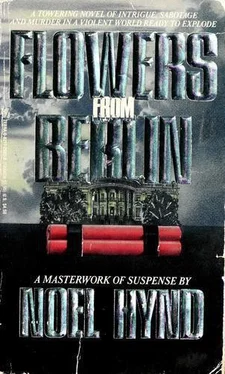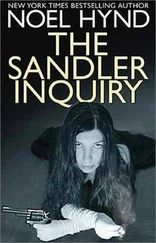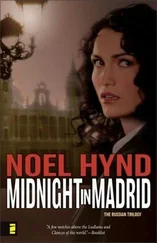Noel Hynd - Flowers From Berlin
Здесь есть возможность читать онлайн «Noel Hynd - Flowers From Berlin» весь текст электронной книги совершенно бесплатно (целиком полную версию без сокращений). В некоторых случаях можно слушать аудио, скачать через торрент в формате fb2 и присутствует краткое содержание. Жанр: Политический детектив, на английском языке. Описание произведения, (предисловие) а так же отзывы посетителей доступны на портале библиотеки ЛибКат.
- Название:Flowers From Berlin
- Автор:
- Жанр:
- Год:неизвестен
- ISBN:нет данных
- Рейтинг книги:3 / 5. Голосов: 1
-
Избранное:Добавить в избранное
- Отзывы:
-
Ваша оценка:
- 60
- 1
- 2
- 3
- 4
- 5
Flowers From Berlin: краткое содержание, описание и аннотация
Предлагаем к чтению аннотацию, описание, краткое содержание или предисловие (зависит от того, что написал сам автор книги «Flowers From Berlin»). Если вы не нашли необходимую информацию о книге — напишите в комментариях, мы постараемся отыскать её.
Flowers From Berlin — читать онлайн бесплатно полную книгу (весь текст) целиком
Ниже представлен текст книги, разбитый по страницам. Система сохранения места последней прочитанной страницы, позволяет с удобством читать онлайн бесплатно книгу «Flowers From Berlin», без необходимости каждый раз заново искать на чём Вы остановились. Поставьте закладку, и сможете в любой момент перейти на страницу, на которой закончили чтение.
Интервал:
Закладка:
Hoover bristled instantly and opened his mouth to speak. Then he stopped. From the President's intonation, Hoover knew there was more. And he knew better than to interrupt. Back in July, Roosevelt had attempted to revise the Neutrality Act so that the United States might aid the democracies of Western Europe against Nazi aggression. Roosevelt had been defeated in both the House and the Senate. The United States was to remain strictly neutral and send no war materiel to anyone.
Undaunted, and risking impeachment, Roosevelt attempted anyway to assist those whom he considered to be America's friends, particularly England and France. But equally undaunted, a nameless, faceless and perhaps self-styled agent of the Third Reich had taken matters into his own hands. Roosevelt recited from memory a litany of incidents.
An explosion in a Newark, New Jersey warehouse had slowed the delivery of five thousand M-1 rifles to anti-Fascist partisans in Greece; a dynamite bomb in a Ford parts plant in Delaware had destroyed production capacity for a specific line of tank gearboxes essential to the French Army; yet another bomb, planted near a furnace in the Frankford Arsenal in Germantown, Pennsylvania, had almost brought down that entire edifice, a disaster which might have set back munitions production in the eastern United States by nine months. On and on the list went, incident after incident. Hoover squirmed uncomfortably until the President concluded with the plight of HMS Wolfe.
"Tell me, Mr. Hoover," Roosevelt asked rhetorically, "how does a saboteur, particularly the one whom your Bureau is searching for, creep onto a religiously guarded vessel, plant a bomb, and sneak off again?"
Hoover was about to answer, but Roosevelt kept talking.
"There is a man at large somewhere in America," Roosevelt postulated, "who is both an expert at espionage and high-level explosives. He is costing us lives and he is robbing precious war materiel from the democracies of Europe. But he is an unnaturally clever man. Your F.B.I. cannot arrest him because you do not know whom to arrest. You cannot look for him because no one knows for whom to look. Indeed, the local police departments in the cities and towns of the Northeast cannot be used because we haven't the faintest idea which ones should even be contacted."
Hoover sat in silence. The President looked him up and. down. "Well, what do you think, J. Edgar?" Roosevelt asked at length. "Have you been struck dumb? You've barely said a word since you walked in here."
"The Bureau," Hoover replied quickly and defensively, "is working on this precise case day and-"
"What has been accomplished?"
Hoover groped. He mentioned a Portuguese network that could be closed down at any moment. And he spoke of a man named Fritz Duquaine who was believed to have entered the country from Vancouver some months earlier and who the F.B.I. had good cause to believe was operating in the Northeast.
"But you have no proof?"
"No, sir."
"And you have no suspects who are so enormously gifted with explosives?"
"No, Mr. President." Hoover verged on mentioning that no fewer than 43,000 immigrants had filtered into the United States from Germany since 1929. Sorting through them for a gifted bomber was not easy. But Roosevelt was speaking again.
"Tell me," said the President. "Do I misunderstand the situation or am I correct? What we need is a face. A name. Or a past. We must find out who this man is, where he came from, and what his background might be. All this is even more important than a current identity because this man would certainly be gifted also at changing identities."
"That's all correct, sir."
Roosevelt continued to lead the conversation. "So what we are talking about is a bit of detective work. Identifying this particular man and locating him is the first task, without which any other plans are meaningless. And, of course, this work must proceed without alerting the suspect. Otherwise he will disappear and move elsewhere. Or return to Germany, perhaps."
Mrs. LeHand buzzed the intercom again and notified the President that the secretaries of State and Interior were awaiting the President in the downstairs dining room. Roosevelt selected a fresh cigarette from the tin of Camels on his desk, placed it into a tortoiseshell holder, and slipped the holder between his teeth. Then he shifted uncomfortably in his chair, leaned back slightly, and lit his cigarette.
"Now, Mr. Director," Roosevelt concluded, "who is the best detective in your Federal Bureau of Investigation?"
Hoover considered it for a few seconds. "The best detective within the F.B.I.," answered J. Edgar Hoover, "would be Frank Lerrick. Special Agent Lerrick is director of personnel as well as my own chief assistant. He's currently employed at Bureau headquarters on Constitution Avenue."
Roosevelt pursed his lips and waited impatiently. He glanced downward to the papers on his desk. Hoover shifted his weight slightly in the armchair.
Then Roosevelt looked up again. "Tell me, J. Edgar," the President said, "weren't we successful several months ago in infiltrating a man into Germany? A man who returned some very good intelligence for us? He was a linguist and a financial man of some sort. Even had explosives training in the United States Army."
"Yes, Mr. President. That's entirely correct."
"I believe he's returned home, has he not?"
"Yes, sir."
Now the President cleared his throat.
"Yes, of course," said Hoover, as if to suddenly remember. "Naturally, the man is still employed by the Bureau. I believe his name is-"
"Cochrane," Roosevelt said. "I recall. William Thomas Cochrane. Where is he?"
"He's currently assigned to Baltimore."
"Baltimore?" The President arched an eyebrow. "Doing what?"
"He's in the Mid-Atlantic States Banking Fraud Division," Hoover said.
Roosevelt added nothing for many seconds. "Really?" he finally breathed.
"I can reassign him this afternoon," Hoover volunteered.
The President smiled widely and extinguished his cigarette, carefully removing the stub from the holder. "Very good, J. Edgar," Roosevelt concluded. "I was confident that you would know exactly who should head this investigation."
As if by magic, two Secret Service men appeared and moved to a position behind the President of the United States, preparing to wheel him to the luncheon for which he was already five minutes late. Hoover instinctively rose. The Secret Service agents, employees of the Treasury, ignored him completely.
"I think," Roosevelt said in parting, "that you and I should meet again, J. Edgar. In about a month. I'd like to know how this saboteur has been captured."
Hoover thought his ears were failing. "A month?" he asked.
"Good Gracious, Mr. Hoover!" Roosevelt suddenly roared, his chair halting, his face florid. "There's a war breaking out in Europe! You don't think we have all year, do you?"
TWO
Franklin Roosevelt and J. Edgar Hoover: the aristocrat from Hyde Park and the ambitious self-made Washingtonian who in 1917 had landed a twenty-five-dollar-a-week job as a file clerk in the crime bureau. They were never the best of friends. Frequently, during the overlapping years of their careers, they were political adversaries. Extraordinary events were essential even for the two men to sit cordially in the same room with each other.
But extraordinary events had already occurred- with no distinct pattern at varying times on two different continents. At their center were three principals: a dedicated spy serving Hitler's Germany, a young Englishwoman, and a widowed American banker in the employ of his own government. Certain events reached as far back as two decades. Others were recent.
For example, late in June of 1939, the spy who called himself Siegfried had again traveled to New York. He had been at Fritz Duquaine's apartment in Manhattan's East Eighties when a third man, one whom both Duquaine and Siegfried expected, knocked on the door. It was past 11 P.M. Duquaine recognized the knock and admitted his visitor, a naturalized American named Wilhelm Hunsicker. Hunsicker, as Siegfried sat in an armchair and studied him, was a hulking, heavy, thick-browed blue-jowled man who was the head butcher on the passenger liner SS Panama. Duquaine often used Hunsicker for special assignments. The Panama had been in port for twelve hours and would be sailing again that next evening, bound first for Cork, in Ireland, and ultimately Genoa, Italy.
Читать дальшеИнтервал:
Закладка:
Похожие книги на «Flowers From Berlin»
Представляем Вашему вниманию похожие книги на «Flowers From Berlin» списком для выбора. Мы отобрали схожую по названию и смыслу литературу в надежде предоставить читателям больше вариантов отыскать новые, интересные, ещё непрочитанные произведения.
Обсуждение, отзывы о книге «Flowers From Berlin» и просто собственные мнения читателей. Оставьте ваши комментарии, напишите, что Вы думаете о произведении, его смысле или главных героях. Укажите что конкретно понравилось, а что нет, и почему Вы так считаете.












